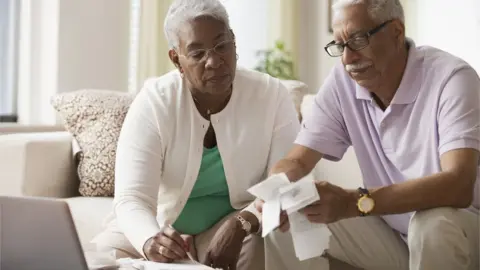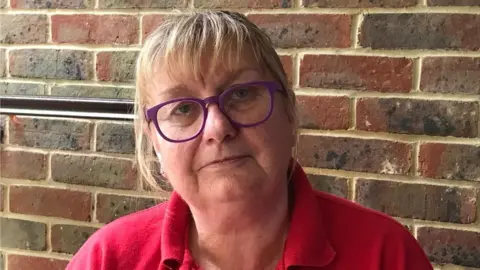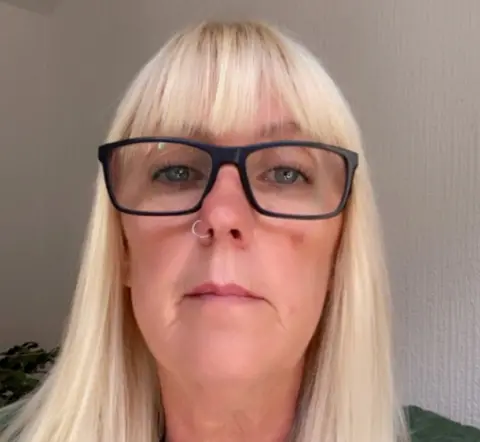The people stuck renting who can't afford to retire
 Trudy Coles
Trudy ColesTrudy Coles and her husband Ron are both 71 and still working, but it's not out of choice.
The couple cannot afford to retire because their savings and pensions would not cover their rent and bills.
They are among a growing number of older renters who are struggling as the cost of living - and rent - rises.
Housing charity Shelter told the BBC it had surveyed 2,000 renters and found more than a quarter of over-55s are behind on rent or struggling to pay.
It also said 29% of over-65s who have called its emergency helpline so far this year were deemed to be at high risk of homelessness. That is up from 21% last year.
'It's scary'
"We have to keep working if we want to keep this place," Mrs Coles told the BBC. "I'm terrified one of us will get ill or lose our job as I don't think we'd manage."
Mr and Mrs Coles once owned their own home but had to sell it when their business got into financial difficulties.
They now rent a two-bedroom flat in Hayling Island, Hampshire for £900 a month and pay £400 in council tax and bills.
It leaves them with just enough for shopping, essentials and running a car but they have to work to cover those costs.
Mrs Coles works 17 hours a week as a chef and waitress, while her husband works for 32 hours as a hotel groundsman.
They do not qualify for a council flat or housing benefit, she said, and the only way they could retire would be by moving into a smaller flat a long way from where they live now, leaving their children and grandchildren behind.
"My biggest fear is we will end up homeless as we get older," said Mrs Coles when asked how she felt about the future. "It feels like there are no options, it's scary."
 Getty Images
Getty ImagesAccording to the government's 2020-21 English Housing Survey, the number of over-65s in privately rented housing has increased from 276,000 a decade ago to 382,000.
This is against a backdrop of rents shooting up across the UK - an issue now compounded by surging food and energy bills.
Charlie Trew, Shelter's head of policy, said the charity was seeing "more and more" cases of older people scraping money together each month just to pay their rent.
For many retirement was a "pipe dream" unless their circumstances change drastically, he said.
'No choice but to downsize'
According to Shelter, older renters may be able to claim housing benefit to help them with their costs.
But it is limited to cover only the cheapest local rents, Mr Trew said, and was frozen across the UK in 2020. Since then, average UK rents have gone up almost 16%, according to property website Zoopla.
The shortfall can leave older renters with "no choice but to downsize or move to another area, leaving support networks behind," he said.
Some may be able to apply for a council home, but there is no guarantee they'll get one quickly.
"Councils have huge waiting lists with about a million households waiting for a home nationally," Mr Trew said.
"You also need to meet certain criteria to be approved, like being homeless or having lived in the area a long time. There's no guarantee you'll be treated as a priority because you're older."
 Therese
ThereseTherese, 61, is another renter who sees no prospect of retiring.
She lives in a two-bedroom terraced house in Tonbridge in Kent with her 23-year-old daughter and works four days a week in a nursery.
But she has back problems and does not know how long she can keep working for.
"I don't buy clothes or go out very often. I dye my own hair and get a friend to cut it…We rarely put on the heating and I make cheap meals," she said of her financial situation.
"If I fall behind on the rent they might consider me homeless and help me."
Therese earns about £1,100 a month from her job and a small pension. She also receives £300 in Universal Credit and her daughter contributes a further £200.
But after all of her outgoings she says she has just £150 left for anything else. Her rent - at £985 a month - is also due to go up by £49 in November after increasing by £40 last year.

What should you do if you cannot pay your rent?
- Paying your rent should be your "number one priority" because if you fall behind you could be at risk of eviction.
- If you are struggling, Shelter recommends making a list of your current outgoings with rent at the top, then see where you can make cuts to ensure you have enough money to go round.
- Do not ignore letters from your landlord or letting agent - instead, see if you can work out a repayment plan using online calculators to help you. Shelter has a repayment plan proposal template letter people can use to communicate with their landlord.
- You could also try to negotiate a rent reduction with your landlord.
- If you are claiming benefits, you can ask the Department for Work and Pensions to pay your housing element straight to your landlord if you owe at least two months' rent and in some other situations. This can speed things up if you face eviction and reassure your landlord.
Source: Shelter

"If my daughter moves out, which she will do eventually, I won't be able to afford to stay here. It makes me really anxious. My future doesn't look very bright to be honest," she said.
Shelter said almost one in three renters over 55 were "severely rent burdened" in August . That means they were spending half their monthly household income or more on rent.
The state pension, which men and women get from 66, helps but is rarely enough to live on by itself, the charity said.
 Julie
JulieJulie from Runcorn in Cheshire said there was "practically nothing left over" after she has paid her monthly rent and bills.
Yet she said she's not eligible for any benefits because of the meagre income she brings in.
The 58-year-old lives in a small house with her daughter, who is unemployed, and works during the week at an Amazon fulfilment centre and on Sundays at a race track.
"I am working hard, 10 and a half hour days. I come home and want a decent meal and I'm having beans on toast. It's disheartening, it really is," Julie said.
She also can't imagine retiring as she wouldn't be able to cover her costs with a state pension alone.
She can't downsize either because her daughter - who suffers from depression - would have nowhere to go.
"I have been on the social housing register for over seven years, I have had no luck," Julie added.
"If I wanted a two-bed property in Runcorn, I would be 260th on the list - I have more chances of winning the lottery."
A government spokesperson said it had increased housing benefit "significantly and beyond inflation" during the pandemic, giving a million households an extra £600 a year.
They also said it was also providing vulnerable families with at least £1,200 in direct payments to help with rising prices, on top of other support for energy bills.
The spokesperson said waiting lists for council housing were falling "because we've given councils the flexibility to manage them". They also said the government had taken action to build more homes.


